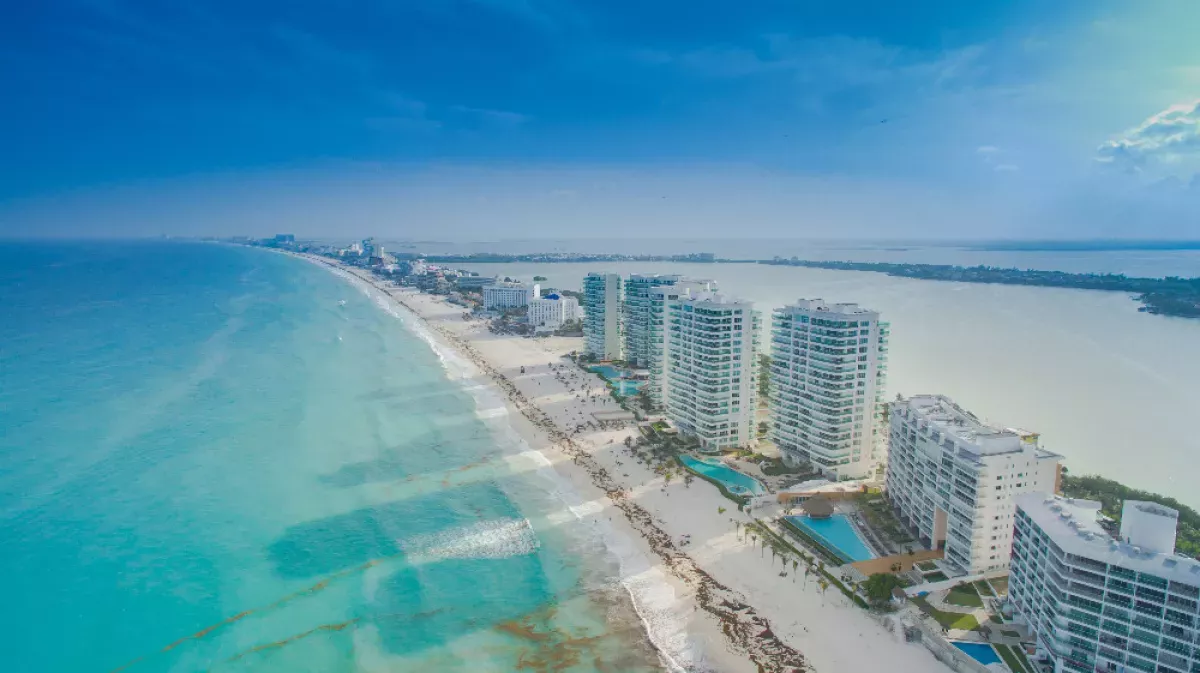Cancún is the most populous city in Quintana Roo, Mexico, situated on the northeast coast of the Yucatán Peninsula. A major tourist destination, it's the seat of the Benito Juárez municipality. Located on the Caribbean Sea, it's north of the Riviera Maya and features the Hotel Zone as its primary tourist area.
3 hours ago : Canadians face gastro outbreak in Cancun resort; hotel demands NDA for treatment.
Canadians vacationing in Cancun experienced a severe gastro outbreak, with symptoms including vomiting, cramps, and diarrhea. Affected tourists reported that the hotel required them to sign a non-disclosure agreement before receiving medical attention.
1916: Atlante F.C. founded in Mexico City
Football club Atlante F.C. was founded in 1916 in Mexico City.
January 23, 1970: Development of Cancún as a resort started
On January 23, 1970, the development of Cancún as a resort began. At that time, Isla Cancún had only three residents, caretakers of a coconut plantation, while nearby Puerto Juárez was a small fishing village and military base with 117 residents.
1970: Population growth in Cancún
From 1970 to 1980, Cancún experienced an average annual population growth of 62.3%.
1974: Cancún began as a tourism project
In 1974, Cancún began as a tourism project, an Integrally Planned Center spearheaded by FONATUR, which was previously known as INFRATUR. This marked the beginning of its transformation from a fisherman's island to a major Mexican resort.
1980: Population growth in Cancún
From 1970 to 1980, Cancún experienced an average annual population growth of 62.3%.
1981: North-South Summit held in Cancún
On October 22 and 23, 1981, the North-South Summit was held at the Sheraton Hotel. The structure was decorated with abstract pillars made of metal crossbeams, with small masts displaying the flags of the countries attending.
September 1988: Hurricane Gilbert devastated Cancún
In September 1988, Hurricane Gilbert made a devastating direct hit on Cancún, necessitating the rebuilding of tourist hotels.
1988: Hurricane Gilbert made landfall on Yucatán peninsula
In 1988, Hurricane Gilbert made landfall on the Yucatán peninsula after crossing over Cozumel, leading to an estimated loss of $87 million USD (1989 value) due to a decline in tourism in the Cancún region.
1989: Economic losses due to decline in tourism after Hurricane Gilbert
In 1988, Hurricane Gilbert led to an estimated loss of $87 million USD (1989 value) due to a decline in tourism in the Cancún region.
1994: Demolition of the commemorative structure in Cancún
In 1994, the municipal authorities of Cancún decided to demolish the commemorative structure because of the damage caused by Hurricane Gilberto.
2002: Construction of old airport tower memorial
In 2002, the tower memorial at the old airport location, now Kabah Avenue, was first built with a donation by Aerocaribe, a local airline.
October 21, 2005: Hurricane Wilma made landfall on Mexico's Yucatán Peninsula
On October 21, 2005, Hurricane Wilma made landfall on Mexico's Yucatán Peninsula as a powerful Category 4 hurricane. The hurricane's eye passed over Cozumel and made landfall near Playa del Carmen, with the center passing just west of Cancún.
2005: Hurricane Wilma impacted Cancún
In 2005, Hurricane Wilma, being the largest Hurricane impacted Cancún.
2005: Damage to old airport tower memorial after Hurricane Wilma
In 2005, the old airport tower memorial was damaged after Hurricane Wilma.
2006: Squatters and irregular developments in Cancún
In 2006, it was estimated that squatters and irregular developments occupied ten to fifteen percent of the mainland area on the fringes of Cancún, creating challenges for municipal authorities in providing public services.
2007: Hurricane Dean impacted Cancún
In 2007, Hurricane Dean also made its mark on the city of Cancún.
October 2009: New runway commenced operation at Cancún International Airport
In October 2009, a new main runway commenced operation at Cancún International Airport.
2010: Los Zetas took control of smuggling routes
By 2010, Los Zetas, a group that broke away from the Gulf Cartel, had reportedly taken control of many smuggling routes through the Yucatán, according to the U.S. Drug Enforcement Administration.
2010: Reconstruction of old airport tower memorial
In 2010, a new version of the old airport tower memorial was erected, after pleas by the local people to rebuild it, but was later abandoned until Woox Pinturas restored it to its original appearance.
2013: Murders in Cancún related to drug trafficking
Between 2013 and 2016, there were 76 murders in Cancún, the vast majority related to drug trafficking.
2015: Sargassum seaweed impacted Cancún tourism
Starting in 2015, Cancún tourism was significantly impacted by the appearance of large amounts of smelly Sargassum seaweed on its beaches every summer.
2016: Murders in Cancún related to drug trafficking
Between 2013 and 2016, there were 76 murders in Cancún, with 31 occurring in 2016, the vast majority related to drug trafficking.
January 2017: Homicides increased in Cancún
The number of homicides in Cancún increased from January 2017 to January 2018, with the latter experiencing triple the number of homicides.
January 2018: High wave of violence in Cancún
Beginning in 2018 with a high wave of violence, Cancún experienced 33 homicides in January 2018 alone, tripling the number from January 2017.
June 2020: Atlante F.C. moved back to Mexico City; Cafetaleros de Chiapas relocated to Cancún
In June 2020, Atlante F.C. relocated back to Mexico City, and Cafetaleros de Chiapas moved to Cancún and was renamed Cancún F.C.
June 2020: Construction of Tren Maya started
In June 2020, construction of the Tren Maya, which will connect Cancún to Palenque, Chiapas, began.
2020: Implementation of VisiTAX for international visitors
In 2020, the Quintana Roo government implemented a law that all international visitors arriving to the State of Quintana Roo are required to pay a fee called the VisiTAX. Visitors with a Mexican passport are exempted from the tax.
2021: Sargassum season became an annual occurrence
By 2021, the Sargassum season had become an annual occurrence at many Caribbean beach destinations, including Cancún.
2022: Dissolution of FAM league, ending Tiburones de Cancún's participation
In 2022, the Fútbol Americano de México (FAM) league dissolved, ending the Tiburones de Cancún (Cancún Sharks) participation.
October 2023: WTA Finals held in Cancún
In October 2023, the WTA Finals (Women's Tennis Association) were held in Cancún. Players Aryna Sabalenka and Elena Rybakina criticized the facility for being unacceptable for high-level tennis and not ready in time for practice.
December 15, 2023: Tren Maya operations started
On December 15, 2023, the Tren Maya, connecting Cancún to Palenque, Chiapas, started operations.
2023: Record number of tourists visited Cancún
In 2023, Cancún welcomed a record 21 million tourists, surpassing the initial estimate of 20.5 million visitors.
April 2024: New air-conditioned buses and route changes announced
In April 2024, SEA announced it had received 100 new air-conditioned buses for the R-1 and R-2 routes and that the routes would be phased out for a new corridor between the Hotel Zone and Kabah Avenue.
August 2024: ADO subsidiary interested in operating buses in Cancún
In August 2024, it was reported that a subsidiary of ADO was interested in operating 184 bus units in Cancún.
February 2025: Cancún Tennis Open will take place
Since February 2025, the Cancún Country Club Residencial & Golf in Cancún hosts the WTA 125 tennis tournament "Cancún Tennis Open", that takes place on outdoor hardcourts.
Mentioned in this timeline

Football is a family of team sports primarily involving kicking...

Mexico City is the capital and largest city of Mexico...

Aryna Sabalenka is a highly accomplished Belarusian professional tennis player...
Mexico officially the United Mexican States is a North American...

Elena Rybakina is a Kazakhstani professional tennis player currently ranked...

A bank is a financial intermediary that accepts deposits from...
Trending

25 minutes ago Sebastian Korda Dominates Tommy Paul to Win Delray Beach Open Trophy.

25 minutes ago Kyle Larson crashes in Atlanta race after SVG contact; Wallace wins stage.

26 minutes ago Adam Scott eyes third Riviera title at Genesis Invitational after impressive round.
1 hour ago Zimbabwe launches HIV prevention drug Lenacapavir; Kenya to roll out HIV shots.

1 hour ago Tami Roman Shines in 'Double Double Trouble' Premiere on Lifetime Channel

1 hour ago Pat Riley Honored with Statue Outside Lakers' Arena, Cementing Legacy.
Popular

Jesse Jackson is an American civil rights activist politician and...

Barack Obama the th U S President - was the...

Bernie Sanders is a prominent American politician currently serving as...

Michael Joseph Jackson the King of Pop was a highly...
The Winter Olympic Games a major international multi-sport event held...
WWE Raw a professional wrestling television program by WWE airs...
